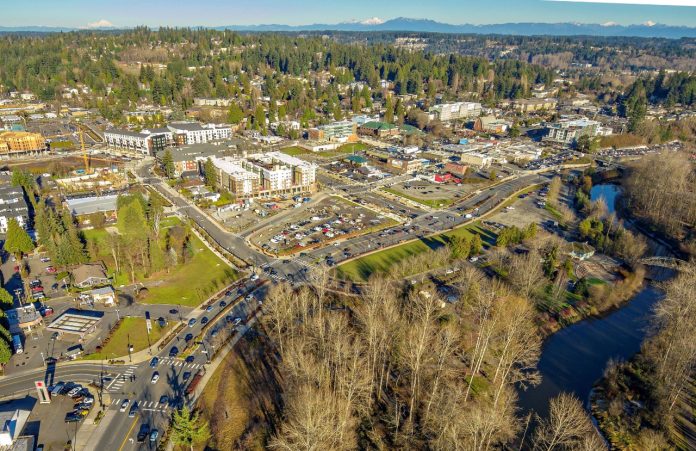
By a 5-1 vote Tuesday night, the Bothell City Council voted to overhaul its land use code with a package of reforms intended to make it easier to build housing and open small businesses. Among the changes were the full elimination of requirements for off-street car parking in new developments, and the full legalization of neighborhood corner stores and cafes citywide. The moves are big steps for the city of nearly 52,000 that has been positioning itself as a regional leader when it comes to smart land use reforms.
Bothell’s vote to completely ditch off-street parking requirements is a first for any city in King or Snohomish County — Bothell straddles both — and it becomes only the fifth city statewide to take such a step. With the cost of structured parking in new buildings regularly approaching $60,000 per stall, according to the Sightline Institute, allowing builders to tailor the amount of parking to meet demand without an arbitrary minimum to hit will remove excess costs from homebuilding.
Without costly parking requirements, builders can make more projects pencil out as feasible, especially on smaller lots. Not needing to add parking stalls on-site can make room for additional housing than otherwise possible. Given those advantages, dropping parking mandates tends to stimulate homebuilding while getting rid of a hidden subsidy for cars.
“I am really excited tonight, because we get to take a big step away from the way we’ve always done things, toward our community’s values a little bit closer,” Bothell Mayor Mason Thompson said ahead of the vote. “And the mechanics of parking minimums essentially tax new housing and new businesses that we say we really want, and we use that tax toward building something that creates more traffic and more pollution. And I’ve had thousands of conversations with Bothell residents over the last few years, and I’ve never had a single person say, do you know what? We need more traffic and more pollution. And I’m really excited to get rid of policy that subsidizes both.”
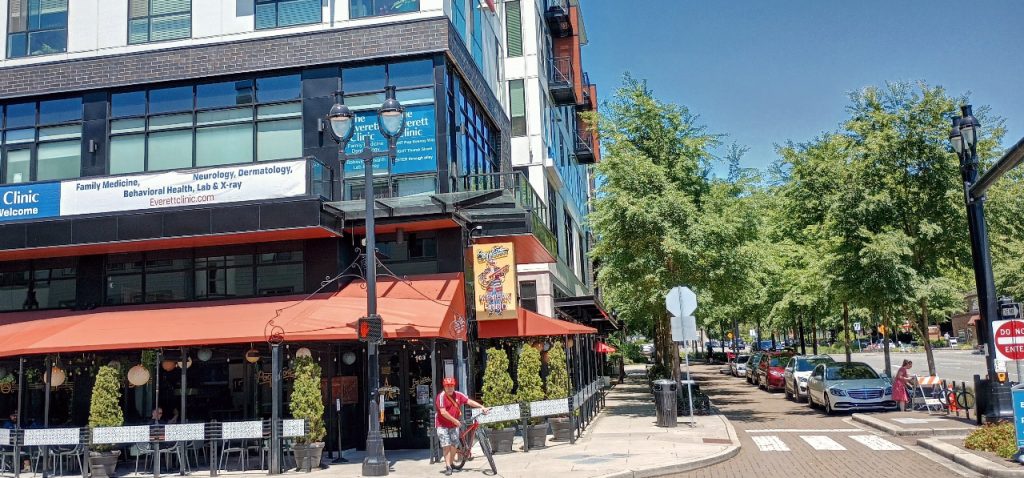
Buoyed by a progressive supermajority its city council, Bothell has been taking bolder and bolder steps toward increased vibrancy and denser housing in recent years. Its bustling downtown, which benefited from rerouting State Route 522 away from the urban core in the early 2010s, turned into an even bigger draw with the pedestrianization of Main Street. The city took steps to allow additional residential density in the wake of new state mandates in late 2023, well over a year before many larger cities scrambled to comply this summer.
The idea of reforming parking reforms in Bothell was prompted, in part, by the passage of Senate Bill 5184 this spring, which requires large and mid-sized cities to reduce required parking stalls to 0.5 per housing unit in multifamily buildings. It also requires cities to exempt uses like affordable housing and smaller apartment units from minimums entirely. During a discussion of potential Comprehensive Plan updates earlier this spring, a majority of the Bothell Council was in favor of just going ahead and removing all parking mandates, 18 months ahead of schedule.
“I will be another voice to supporting the removal of outdated, unscientific, kind of like throwing darts at a dart board parking minimums and how they have developed over time, so that developers can choose what is most marketable for them,” Councilmember Jenne Alderks said at that time.
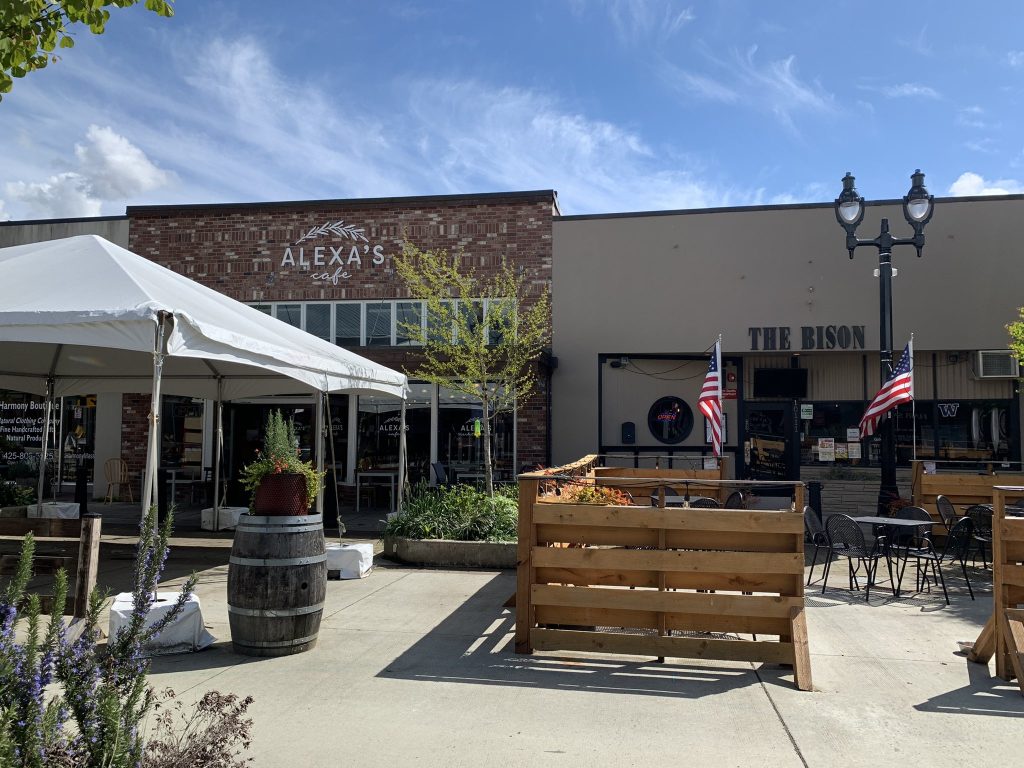
Cafes and corner stores: legal in all Bothell neighborhoods
Bothell’s new rules for allowing neighborhood corner stores and cafes are some of the most permissive in the state. Along with those uses, property owners can open bars and taverns, bike shops, boutiques, artisan manufacturing facilities with on-site sales, offices, art galleries, salons, and child care centers in all residential zones. Operating hours would be limited to 6am to 10pm Monday through Friday — the opening hour limit goes to 7am on weekends.
“Neighborhood Scale Commercial uses are intended to promote neighborhood vitality and compatibility with surrounding residential areas, allowing only small-scale retail, service, and residential uses that primarily serve local residents with minimal traffic from outside the neighborhood,” the new code states. “These businesses should support live-work opportunities, be easily accessible by walking, biking, and local transit, and contribute to vibrant, pedestrian-friendly community hubs which eliminate reliance on automobiles.”
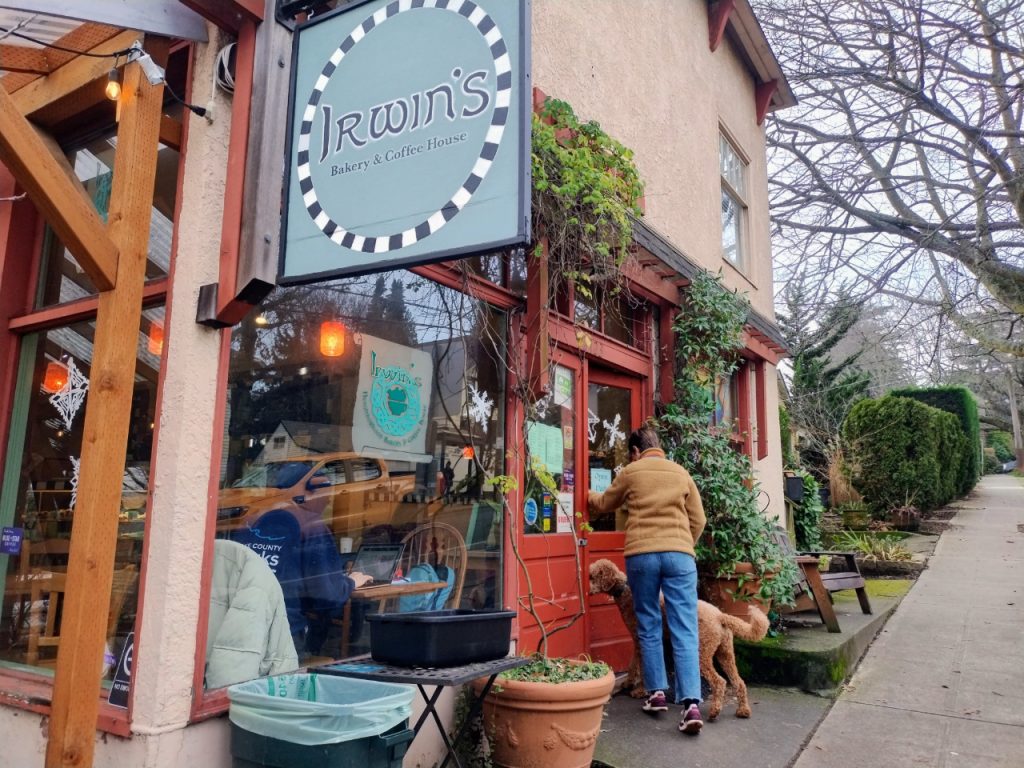
On small lots, neighborhood commercial spaces are capped at 1,800 square feet, or square footage can scale up by calculating 30% of the net buildable area of a lot, up to a maximum size of 2,500 square feet. In nearby Shoreline, which legalized neighborhood commercial storefronts early this year, a cap of 1,200 square feet was adopted for most residential zones, but that cap can be lifted to 2,000 square feet if a store is built within an existing building.
Other cities are set to follow in these jurisdictions’ footprints, though potentially with more onerous restrictions. In Burien, for example, corner stores and cafes are set to have a required closing time of 8pm, a move that could limit what types of businesses become viable. Meanwhile, Seattle’s pending neighborhood cafe regulations are poised to restrict corner stores to literal corners, keeping them banned mid-block.
“I am really excited about corner stores,” Thompson said as the policy was advancing back in June. “More cool businesses to walk to, more opportunities for entrepreneurs getting started, for small businesses, I think this is so cool and I think when we finally start getting these things built people are going to absolutely love it.”
Bothell’s support for creating small business incubators isn’t confined to its residential neighborhoods. In 2021, the city utilized a vacant lot downtown for its Pop Shops on Main program, in which tiny temporary retail spaces provided space for entrepreneurs to be able to have a brick-and-mortar space while at the same time encouraging people to come downtown.
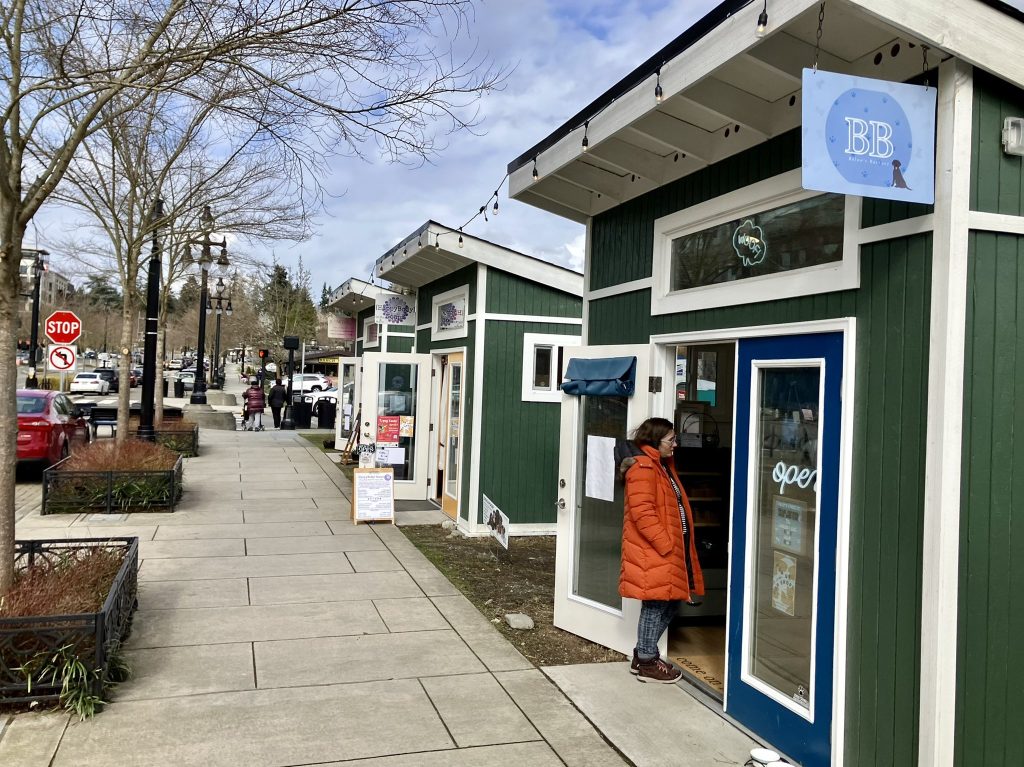
This week’s votes clearly solidify Bothell’s role as a regional leader when it comes to land use reforms, particularly on the Eastside. During a panel discussion this past weekend hosted by The Urbanist at Bellevue’s Highland Community Center, Thompson was asked what factors led to his city being able to take these major steps ahead of other cities.
“I think in a lot of ways, we got pretty lucky. We have some exceptionally talented people with really good values that ran for office,” Thompson said. “I think just if there’s any special sauce we’ve had, it’s just some really brilliant people and the ability to communicate with people where they’re at about things they care about, because not everybody cares about the same things I care about, and if I talk about things I care about, I’m losing. I need to talk about things somebody else cares about.”
Ryan Packer has been writing for The Urbanist since 2015, and currently reports full-time as Contributing Editor. Their beats are transportation, land use, public space, traffic safety, and obscure community meetings. Packer has also reported for other regional outlets including BikePortland, Seattle Met, and PubliCola. They live in the Capitol Hill neighborhood of Seattle.

